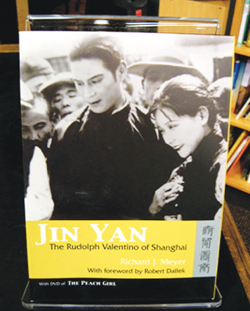By Katie Schmidt
For Northwest Asian Weekly

The book “Jin Yan: The Rudolph Valentino of Shanghai” about Chinese silent film was written by Seattle University Lecturer Richard Meyer and published in March 2009.
Chinese silent films provides a window into history and a reflection of social issues of the time, says Seattle author Richard Meyer, who spoke about his new book, “Jin Yan: The Rudolph Valentino of Shanghai,” at the University Bookstore on Oct. 21.
Meyer spoke as part of the bookstore’s Reading Allowed program, which invites authors to visit and talk about recently released books at the University District store.
“We wanted to share Richard’s unique work with the public,” said UW Bookstore Events Associate Danielle Kish in an e-mail.
Meyer, who teaches film at Seattle University, said that, as a handsome Korean immigrant and movie star, Jin Yan had an interesting life story and an impressive stage presence. Meyer said Jin was able to work in Chinese films because he picked up the language quickly.
“Jin Yan has fascinated me from the first time I saw him on the screen,” Meyer said. “And he, like Rudolph Valentino … fills that screen with such passion and such animal force that you can’t help but keep looking at it.” Valentino was a popular Italian silent film actor known as the ‘Latin Lover.’ Jin is commonly compared to Valentino.
Audience member Charles Randles agreed that Jin’s presence on the screen was striking, and said that his movies showed a side of Chinese film that is often overlooked.
“I never thought of Chinese movies as being sexy or anything like that,” Randles said. “I usually thought about them along the propaganda lines.”

Seattle University Film Lecturer, Richard Meyer, talks about his book, “Jin Yan: The Rudolph Valentino of Shanghai,” at the University Bookstore in Seattle. (Photos by Katie Schmidt)
Meyer also said that Chinese silent films, many of which are not available in the United States, are a lesson in history. Jin’s story provides a look at a tumultuous time in China’s past that included World War II, the Cultural Revolution, and the establishment of the communist People’s Republic of China.
“Through his life, you can get a picture of China in the 20th century because he lived through the whole deal,” Meyer said.
In addition, Meyer said that Jin was able to write social critiques into the films that he acted in without arousing the suspicion of Chinese censors. Along with leading lady Ruan Ling-Yu, he condemned social inequality and feudalism.
“He was able to make films that were anti-establishment by using what we would call the soap opera melodramatic format,” Meyer said. The melodramatic format uses light, soap opera plots to send a social message. Story lines were often formulaic, based on love affairs between the main characters. Because the films Jin made appeared to be simple love stories, censors believed that they were harmless.
Jin’s films are also important to study because of the influence of Chinese actors, directors, and films on Hollywood today, says Meyer.
Susan Harmon, an audience member and Meyer’s wife, agreed that Chinese films are becoming much more widely known because of DVD technology.
“You go to Italy for this silent film festival and you see Chinese films,” she said.
Harmon also said that silent films are told in a universal way that helps people draw connections between themselves and those who live on the other side of the planet.
“My takeaway is the parallels [between] somewhere that seems so esoteric and far away [and our own society],” she said, observing that plots of Jin’s films are universal stories, appealing not only to the Chinese.
Audience member Janeen Jenkins said that exposure to these films have changed the way she looks at the world as well. They showed her a genre of film that she had not been exposed to before and helped her draw comparisons between her life and that of Chinese people during Jin’s era. She mentioned that it made her realize that people today take many things for granted.
“I think that we’re lucky that someone brought this to us,” she said. “The history is interesting, the personal lives are interesting, [and] the cross-cultural references are interesting.
“I think the biggest thing is that it just gives you perspective,” she added. ♦
Katie Schmidt is a student in the University of Washington Department of Communication News Laboratory.
She can be reached at info@nwasianweekly.com.



